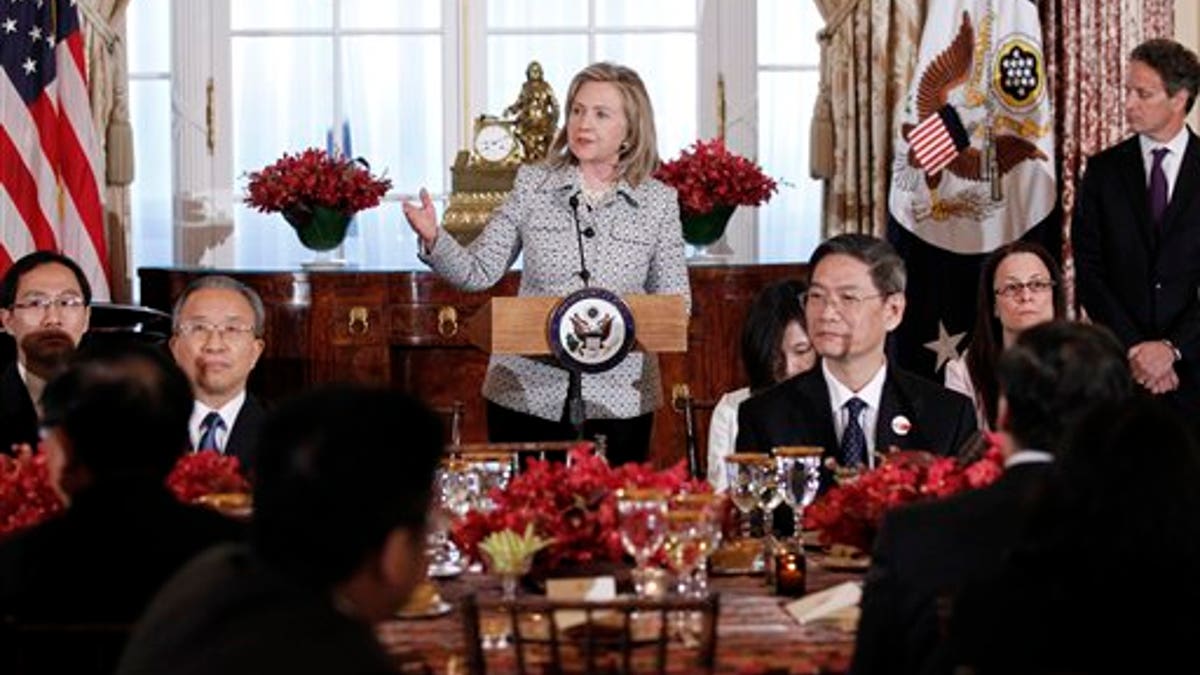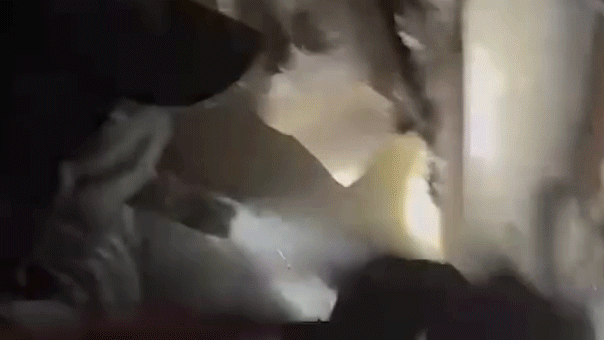
May 9: Secretary of State Hillary Clinton gives remarks during a dinner for the joint meeting of the U.S.-China Strategic and Economic Dialogue at the State Department. (AP)
WASHINGTON – Secretary of State Hillary Rodham Clinton lashed out against China's human rights record in an interview released Tuesday during high-level meetings aimed at building goodwill between the two governments.
In an interview published on the website of The Atlantic magazine, Clinton said China's human rights record is "deplorable" and that history is not on the side of governments that resist democracy.
Clinton had also raised human rights, though less stridently, at the start of the U.S.-China Strategic Dialogue, which entered its second and final day Tuesday. Both countries have tried to stress a generally positive track in relations between the economic superpowers.
China responded in mild terms to President Barack Obama's statement Monday criticizing the crackdown. Human rights is an issue Beijing has regarded as an internal matter — one that officials have been very sensitive about.
The Clinton interview, which took place on April 9, focuses on the democracy protests against authoritarian regimes that have rocked the Middle East and North Africa. Clinton was asked whether China's government is scared by the protests.
She responded: "They're worried, and they are trying to stop history, which is a fool's errand. They cannot do it. But they're going to hold it off as long as possible."
Since February, China has questioned or detained hundreds of lawyers, writers and activists in response to anonymous calls made on the Internet for protests. No demonstrations have happened.
There was no immediate response from China to the interview. Calls to Chinese Foreign Ministry duty officer rang unanswered Tuesday night.
However, at a regularly scheduled briefing in Beijing earlier Tuesday, Chinese Foreign Ministry spokeswoman Jiang Yu said, "No country is perfect in its human rights record and there is no one-size-fits-all human rights policy."
"China and the U.S. have different opinions in the area of human rights and we believe we can use dialogue to increase mutual understanding and mutual trust," Jiang said.
The talks in Washington bring together leaders on economics, foreign policy and security.
After the first day's discussions, Obama met Chinese delegation leader Vice Premier Wang Qishan and State Councilor Dai Bingguo. On human rights, Obama underscored his support for freedom of expression and political participation, a White House statement said.
The president also encouraged China to implement policies to support "balanced global growth as well as a more balanced bilateral economic relationship" — expected to be a key theme of Tuesday's talks.
The U.S. continues to press China to allow its currency to appreciate faster in value against the dollar and to allow Chinese consumer interest rates to rise. Both steps could help boost domestic demand and help lower America's trade deficit, which hit an all-time high with China last year.
On Monday, a Chinese official blamed U.S. policies for the ballooning trade gap. Commerce Minister Chen Deming told a news conference that China's currency appreciation was being carried out in a "very healthy manner." He said the United States needed to change its own policies on high-tech sales and investment as a way to spur American manufacturing.
He took aim at the U.S. screening of Chinese foreign investment proposals, contending it was neither fair nor transparent. Most recently, the Committee on Foreign Investment in the United States rejected a takeover by private Chinese technology giant Huawei of a small U.S. computer company, 3Leaf, on national security grounds.
U.S. companies have their own long list of complaints: limited access to Chinese markets, theft of intellectual property, widespread use in China of counterfeit software and problems in seeking redress through China's legal system.
This year's talks for the first time included high-level military leaders from both nations, a move seen as a way to increase understanding between military commanders and reduce the risk of conflict. China's military has expanded rapidly in the past 15 years, deploying missiles and naval assets that could challenge American supremacy in the region.







































